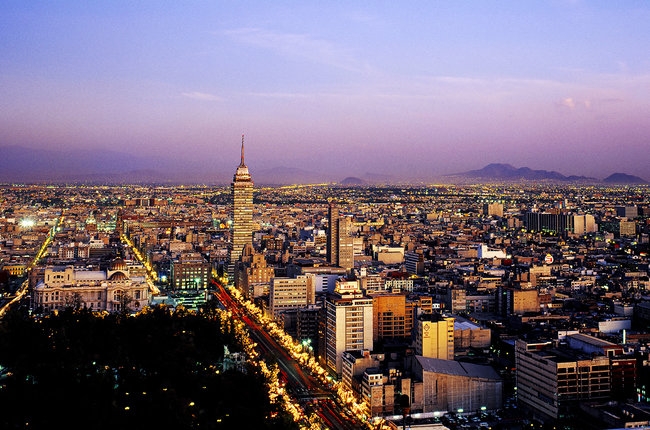When assembling a list of global music business hubs, you might not think of Mexico City, a market that regularly loses tens of billions of pesos to piracy every year. But as streaming cements itself even further as the dominant means of music consumption, Mexico City is evolving into a force that cannot be ignored -- and Spotify has the proof.
At the Billboard Touring Conference on Tuesday (Nov. 14), Andrew McInnes, CEO of TMWRK Management, noted that Mexico City was the top streaming market for his A-list DJ-producer client Diplo. Indeed, a quick search on Spotify reveals that Diplo has over 56 percent more monthly listeners in Mexico City than in the runner-up city of Santiago, Chile (192,831 listeners versus 123,214 listeners as of press time, respectively).
In fact, Diplo is far from alone: artists as diverse as Adele, Dua Lipa, Radiohead, Shania Twain, Harry Styles and Metallica all count Mexico City as their top Spotify market. The trend holds not only for major-label talent, but also for smaller acts like Hippo Campus, Passion Pit and Disclosure who are building legitimate streaming audiences in the city for the first time -- and, more importantly, translating those audiences to live shows.
As a whole, Mexico has inched its way onto the recorded music industry’s radar amidst its ongoing transition away from piracy. According to the IFPI’s latest Global Music Report, the country ranks as the world’s 15th-biggest recorded music market and the 14th-biggest market by digital revenues alone, with streaming driving a 23.6 percent increase in total revenues to US$133.5 million in 2016. That’s a mere 1.7 percent of what the U.S. recorded music market made in the same year, but artists and managers still see the growth opportunity in Mexico as streaming becomes more accessible to the wider public.
Mexico was Spotify’s first-ever Latin American market in 2013 and has since become the service’s third-biggest market worldwide by volume of streams, ranking only behind the U.S. and the U.K. In addition, Spotify captures a whopping 64.1 percent share of Mexico’s streaming market, a clear defeat over rivals Google Play (12.3 percent), Apple Music (8.1 percent) and Tidal (2.1 percent), according to 2016 data from the Competitive Intelligence Unit.
“We’re looking at the possibility of Brazil and Mexico potentially overtaking the UK and Germany in terms of user numbers," Spotify's director of economics Will Page said in a statement for IFPI’s global report. "That’s not to the detriment of the UK and Germany, it’s all about the unexpected and exceptional performance of Brazil and Mexico.”
Part of the explanation for this growth is simply a matter of scale: the Greater Mexico City metropolitan area boasts a population of over 21 million people, eclipsing those of New York, Los Angeles and London. Spotify’s rise in particular can be tied to telecom bundles with the likes of Virgin Mobile and Movistar -- mirroring a phenomenon in other emerging markets like China and India where cellphone providers and big-tech conglomerates are leading the wider conversion from piracy to paid streaming. A Spotify Premium account in Mexico City currently costs 99 pesos (around US$5.23), a much more affordable alternative to piracy than buying CDs or other physical formats at the standard price of 250 pesos (US$13.20).
Interestingly, just five years ago, music enthusiasts noticed a similar dominance of Mexico City among artists’ Facebook followers, but dismissed the trend as phony. The alleged culprits were electronic DJs including Avicii, Skrillex, David Guettaand Steve Aoki, who had a disproportionate number of Facebook likes from the city and were subsequently accused of buying fake fans on the site.
Facebook has since invested heavily in deleting fake accounts, which has negatively impacted a handful of artists in the top one percent. For instance, even though Taylor Swift just released 2017’s top-selling album, she is still losing Facebook fans every quarter, according to analysis from Viberate. Adele, Radiohead and Harry Styles, all of whom have Mexico as their top Facebook market, are seeing a similar downward trend -- but not on Spotify, presumably because the latter is a relatively smaller company and has stronger fraud protection measures in place.
Spotify was unable to provide info to Billboard on its growth in Mexico City, but a LinkedIn search yields around 30 results for current Spotify employees in the region, the majority of which work in marketing, sales and artist services. While Mexico City has a thriving local music scene, it’s worth noting that Spotify market share is still very much a major label game: Universal Music Group accounted for 21 of the top 50 Spotify artists in Mexico in 2016, followers by Sony Music with 18 artists and Warner Music with 9 artists -- leaving only two slots for indie labels.
Nonetheless, the popularity of streaming in Mexico City has opened up new opportunities for international indie artists that were simply impossible even five years ago. In an interview with [PIAS], Tim Dellow, co-founder of Transgressive Records, revealed that Hippo Campus was considering tour dates in Mexico City because they were racking up over 300,000 monthly streams of their lead single “Boyish” from the region, thanks to playlist pickup -- which then trickled into engaged activity for other songs in the band’s catalog. As of press time, Hippo Campus has over 22,600 monthly listeners from Mexico City, 7 percent more than the 21,200 monthly listeners in their No. 2 market in Chicago.
The transparency of Spotify analytics and the power of playlist placement have eliminated what some called the “Mexico City lag,” a concept with both aesthetic and commercial underpinnings. From a creative point of view, certain music scenes and subcultures, particularly around indie rock, used to take a decade or more to pop up in Mexico City after launching in the States. On the commercial side, a handful of major bands like The Cure and The White Stripes made heralded tour stops in Mexico City in the early 2000s, but smaller bands couldn’t follow suit due to the lack of a more immediate method for gauging global demand.
Now, Mexico's music consumption habits evolve more quickly around both local and global trends, while streaming services enable the likes of Hippo Campus to maximize on the same opportunities as the A-listers. As Spotify and the rest of the music business are increasingly banking on Latin America as an indomitable part of their future, Mexico City has already become a core leader of the pack.








